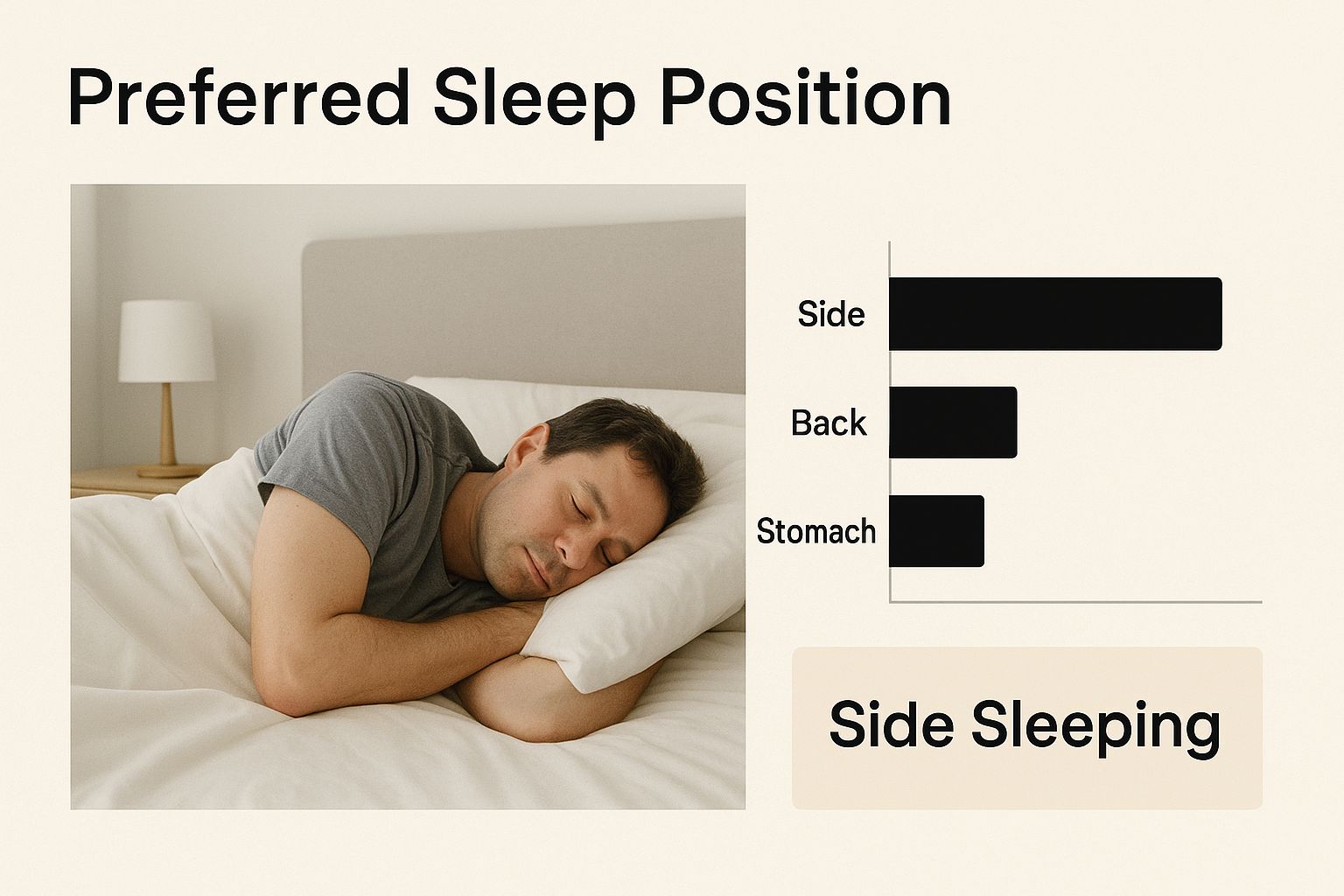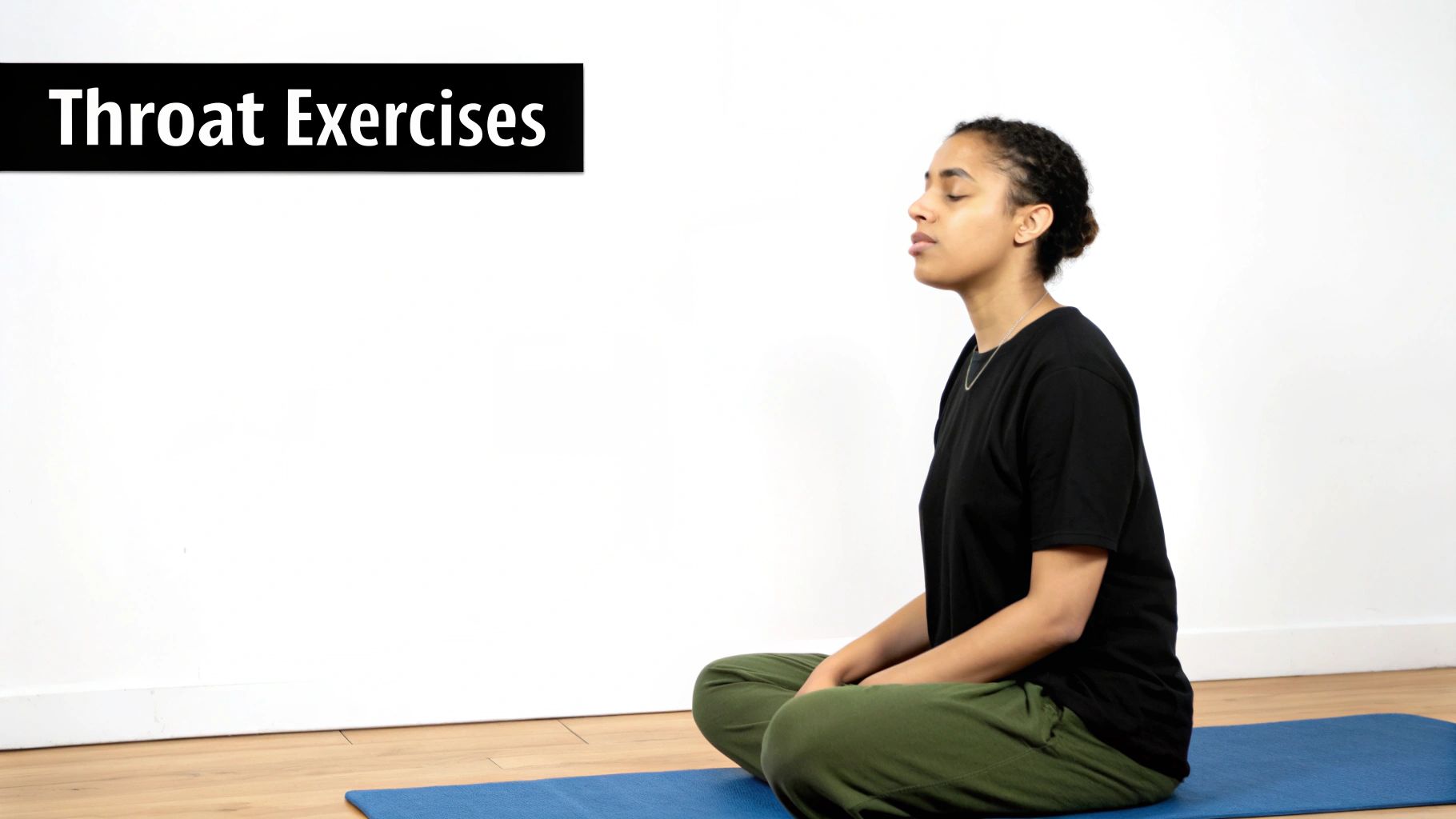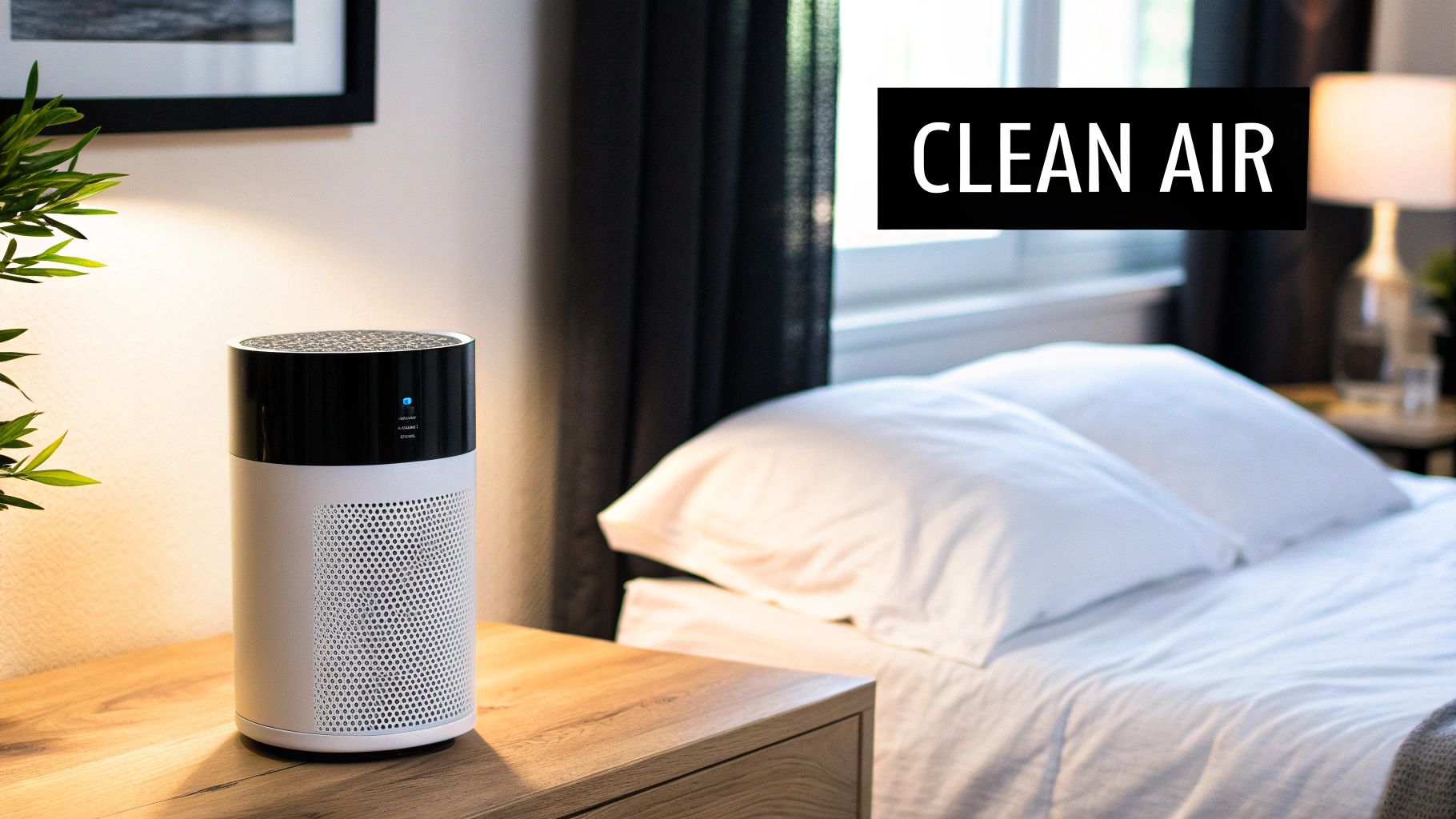What's Really Happening When You Snore
Snoring. It's not just a noisy nighttime nuisance, is it? It's more like a tell-tale sign of what's going on in your throat while you're catching those Z's. Think of your throat as a sort of collapsible tube. During the day, the muscles in your throat hold it nice and open, letting air flow freely. But when you fall asleep, these muscles relax. This is totally normal, but for some of us, this relaxation causes the airway to narrow. As air squeezes through this smaller space, the surrounding tissues vibrate. And that, my friend, is the rumbling sound we know as snoring.
So, what contributes to this nightly serenade? Well, several things. Extra tissue in the throat, which is often the case for those carrying a bit of extra weight, can compress the airway. Think of it like trying to blow air through a slightly squished straw. A deviated septum or nasal polyps can also obstruct the nasal passages, which forces more air through the mouth, making snoring more likely. Even your sleep position matters! Lying on your back allows gravity to pull the tongue and soft palate back towards the throat, further restricting airflow.
And let's not forget about our habits. Smoking and alcohol, while enjoyable for some, can really amplify snoring. Smoking irritates the throat and nasal passages, causing swelling and inflammation. Alcohol further relaxes those throat muscles, even more so than they normally would during sleep. These combined factors can turn an occasional snore into a regular nightly performance. Take me for example. I used to snore only when I had a cold, but as I got a little older, gained a few pounds, and developed a fondness for a nightly glass of wine, the snoring became way more frequent.
It's also important to remember that snoring becomes more common as we age. A global survey revealed that a whopping 77% of people between 55 and 64 reported snoring, compared to only 41% of those aged 18-24. This increase is probably linked to the natural loss of muscle tone as we get older. This fact makes exploring natural ways to reduce snoring even more important as we age. Learn more about how snoring prevalence changes across different age groups here. Ultimately, understanding why you snore is the first step towards finding natural solutions that truly work for you. It's all about fine-tuning your own personal "orchestra" for a quieter, more restful night's sleep.
Bedroom Setup Secrets That Actually Work
Your bedroom can surprisingly impact how well you snooze and how much you snore. After chatting with tons of people who've tamed their nighttime noises, I've noticed some common threads in their sleep sanctuaries. Let's dive into a few key areas.

This infographic shows how simply sleeping on your side can help reduce snoring. It really highlights how this position keeps your airways open. This one little change can make a noticeable difference. Speaking of sleep, you might find this interesting: The Secret to Deeper, More Restful Sleep.
Humidity and Air Quality: Finding the Sweet Spot
Maintaining good humidity is key. Dry air can irritate your nose and throat, making snoring worse. A humidifier can be a lifesaver. Aim for around 30-50% humidity to keep your airways moist. I used to wake up with a Sahara Desert throat, and it definitely fueled my snoring. A humidifier was a game-changer for me. But remember, too much humidity can breed mold, so balance is important.
Pillow Talk: Beyond Ergonomic
Your pillow might be a sneaky snoring accomplice. Ergonomic pillows are great, but sometimes they lift your head too much, which can actually increase snoring. Try different pillow heights. Also, think about the pillow material. Down can trap allergens that irritate your nasal passages. Hypoallergenic pillows might be a better choice.
Strategic Bed Positioning: A Gentle Incline
Even the angle of your bed can play a role. Slightly raising the head of your bed – about 4-6 inches – can help with airflow and reduce snoring. I'm not talking about piling up pillows, just a slight incline. This uses gravity to keep airways open. A friend of mine stumbled upon this trick in a hotel with an adjustable bed, and it seriously quieted his snores.
To make things easier, I've put together a handy checklist. It breaks down the optimal and problematic bedroom setups, along with some quick fixes you can try.
Sleep Environment Optimization Checklist
A comprehensive comparison of bedroom factors that impact snoring, showing optimal vs. problematic conditions.
| Sleep Factor | Snoring-Friendly Setup | Problematic Conditions | Quick Fix |
|---|---|---|---|
| Humidity | 30-50% | Too dry or too humid | Humidifier (for dry air) or dehumidifier (for excess humidity) |
| Pillow | Supportive, hypoallergenic, appropriate height | Too high, allergen-trapping | Experiment with different heights and materials. Try hypoallergenic options. |
| Bed Position | Head of bed elevated 4-6 inches | Flat bed | Place blocks under bedposts or use an adjustable bed frame. |
| Air Quality | Clean, free of dust and allergens | Dust mites, pet dander, pollen | Regularly clean bedding, use an air purifier. |
This checklist highlights some easy changes you can make to your sleep environment. Even small adjustments can make a big difference in your snoring and overall sleep quality.
Daily Habits That Transform Your Nighttime Breathing

Turns out, what you do all day long can seriously affect your snoring. It's not just about weight; little things you choose to do throughout the day can make a big difference in how your throat behaves at night.
The Afternoon Coffee Conundrum
That afternoon coffee might be the secret culprit behind your snoring. Caffeine, while great for a boost, can also dehydrate you. This can lead to thicker nasal secretions, making snoring more likely. I learned this the hard way! My afternoon coffee ritual was wreaking havoc on my sleep. Switching to herbal tea, or even just having my coffee earlier, really helped.
Food as Fuel (or Foe) for Peaceful Sleep
What you eat plays a role, too. Dairy can thicken mucus, which could worsen snoring. Foods rich in magnesium, like leafy greens and almonds, can actually relax throat muscles. I’ve personally found that a light dinner, and skipping dairy a few hours before bed, makes a noticeable difference. Pay attention to how your body reacts to certain foods.
Evening Rituals: The Sequence Matters
Even the order of your evening activities can matter. A workout too close to bedtime can make it harder to fall into a deep sleep, which can indirectly increase snoring. On the flip side, a calming routine—a warm bath, reading—can promote relaxation and quieter breathing.
Lifestyle Tweaks: Finding What Works for You
Everyone's different. What works for one person might not work for another. Finding natural ways to reduce snoring has to fit your life. Talking to others who've successfully tackled their snoring, I've learned that small, consistent changes are better than huge, unsustainable ones. Addressing underlying health concerns, like being overweight, is essential, especially in North America, where sleep apnea is so prevalent. Simple things like maintaining a healthy weight and avoiding alcohol before bed can have a big impact. For more information, check out this resource: Anti-Snoring Devices Market Focused Insights 2025-2030.
Finding the right mix of lifestyle changes that fit into your routine is the real key to success. It's all about making sustainable changes, not quick fixes. This personalized approach will lead to quieter nights and better sleep overall.
Strengthening Exercises That Feel Natural

Just like you can tone your biceps at the gym, you can actually strengthen the muscles in your throat, tongue, and jaw to help reduce snoring. It's surprisingly easy, and these exercises can fit seamlessly into your day. No special equipment required!
Targeting the Root Cause: Muscle Tone
Believe it or not, weak throat muscles are a big reason why people snore. When those muscles get too relaxed during sleep, they let your airway narrow, leading to those noisy vibrations. These exercises are all about toning those key muscles, helping to keep your airway open and quiet things down.
Simple Exercises, Big Impact
Here are a few exercises I’ve found really helpful, and they were actually recommended to me by a sleep therapist:
-
Tongue Slides: Try sliding the tip of your tongue along the roof of your mouth, pushing it back as far as you comfortably can. Repeat this 10-15 times. It’s great for the muscles at the back of your throat. I personally do this while I'm driving – nobody can even tell!
-
Singing Vowels: It might sound a little silly, but belting out those vowels (A-E-I-O-U) for 2-3 minutes can really work out your throat and soft palate muscles. Trust me, it makes a difference.
-
Jaw Push: This one’s easy – just push your lower jaw forward and hold it there for 10 seconds. Do this 5-10 times to strengthen those jaw muscles. I often do this while watching TV.
-
Throat Humming: Humming a tune for a few minutes each day is not only relaxing, but the vibrations also help tone your throat muscles. This is my personal favorite because it feels so soothing.
Realistic Expectations and Timelines
These exercises are simple, but you won't see results overnight. Consistency is the name of the game. You might notice small changes within a few weeks, but bigger improvements usually take a few months of regular practice. Just like building any muscle, it takes time and dedication.
Building It Into Your Day
One of the best things about these exercises is how easily they fit into your routine. You can do tongue slides during your commute, sing vowels in the shower, or do jaw pushes while you're reading a book. Figure out what works for you and make it a habit. Trust me, making these exercises a part of your daily life will pay off with quieter, more restful nights.
Natural Remedies Worth Your Time
So, you're looking for natural ways to quiet those nighttime snores? The internet is full of advice, but let's be honest, sifting through it all can feel like a Herculean task. I've been there, done that, and I'm here to share what's actually worked for me and others I know.
Essential Oils and Herbal Remedies: A Breath of Fresh Air
Let's talk about essential oils. Think peppermint and eucalyptus – these can help open up your airways and make breathing easier. I personally love a blend of eucalyptus and lavender on my pillow before bed. It's super calming and helps me breathe a little easier. A diffuser can work wonders, too. Just a little heads-up: quality matters. Look for pure essential oils for the best results.
Then there are herbal remedies. Butterbur, for example, has shown some promise in reducing nasal inflammation, a common snoring culprit. I've heard great things about it, but it's always smart to chat with your doctor before adding new herbal supplements to your routine, especially if you have other health conditions.
Sleep Position Training: The Side-Sleeping Solution
We've all heard it: side sleeping is better for snoring. And it's true! When you sleep on your back, gravity can pull your tongue and soft palate back towards your throat, narrowing your airway and creating those lovely snoring sounds. Side sleeping helps keep things open. Here's a helpful resource: Effective Ways on How to Prevent Snoring & Sleep Better Tonight.
The trick, though, is staying on your side. My game-changer? A body pillow. I used to toss and turn all night, but hugging a body pillow keeps me comfortably nestled on my side. Another trick I've heard of (though haven't personally tried) is sewing a tennis ball into the back of your pajamas. Sounds a little strange, I know, but the slight discomfort can discourage you from rolling onto your back.
To help you navigate the world of natural snoring remedies, I've put together a handy guide comparing some of the most popular options:
Natural Anti-Snoring Remedies Effectiveness Guide
This table compares various natural remedies, looking at how effective they are, how long it takes to see results, and how easy they are to incorporate into your routine.
| Natural Remedy | Effectiveness Rating | Time to Results | Cost | Best For |
|---|---|---|---|---|
| Essential Oils | Moderate | Immediate - Weeks | Low | Mild snoring, nasal congestion |
| Herbal Remedies (e.g., Butterbur) | Moderate to High | Weeks | Moderate | Nasal inflammation, allergy-related snoring |
| Sleep Position Training | High | Immediate - Weeks | Low to Moderate (for pillows/aids) | Back sleepers, positional snoring |
As you can see, each remedy has its own strengths and weaknesses. Essential oils are a great starting point for mild snoring and nasal congestion, offering quick relief. Herbal remedies like butterbur may take longer to show results but can be very effective for specific issues like nasal inflammation. And finally, sleep position training, often the most effective, addresses the root cause for many snorers.
Finding Your Perfect Snoring Solution
Remember, finding the right natural snoring remedy is a personal journey. What works for one person might not work for another. It's a bit like finding the perfect pair of shoes - you have to try a few on to find the right fit.
Start by picking one or two remedies that seem like a good fit for you. Give them a solid try – at least a few weeks – and keep track of how things are going. A snoring app or a sleep journal can be helpful for monitoring your progress. And don’t lose heart if you don't see results right away. Just like any lifestyle change, it takes time and consistency. Be patient, keep experimenting, and you’ll find that perfect combination of natural remedies to finally quiet your snores and enjoy peaceful, restful sleep.
Recognizing When You Need Professional Support
Natural remedies can do a lot for snoring, but let's be real, sometimes you need a little extra help. Knowing when to call in the pros is important, both for your health and for anyone who shares your airspace at night. This isn’t about ditching the natural stuff, it’s about knowing when to team it up with some expert advice.
Identifying the Red Flags: When Snoring Becomes Serious
We all snore occasionally. It happens. But if your snoring is loud and persistent, and it comes with other symptoms, it might be a sign of something more serious like obstructive sleep apnea (OSA). If you or your bed partner notice gasping, choking, frequent nighttime awakenings, daytime sleepiness, or morning headaches, it’s time to see a doctor. These are red flags you really shouldn't ignore.
Professional Guidance: Enhancing Your Natural Approach
Medical professionals can make your natural snoring remedies even more effective. They can find hidden medical issues contributing to your snoring, like allergies, nasal polyps, or a deviated septum. Getting these things treated can make a huge difference.
For example, a doctor might suggest a specific nasal spray or allergy medication to clear up nasal congestion, a common snoring culprit. They can also look at how you sleep and give you personalized advice on using positional aids or changing your bed setup. Think of it as a two-pronged attack – natural strategies boosted by medical know-how.
The Evolving Field of Sleep Medicine
Sleep medicine is a constantly evolving field, and lots of specialists are now including natural techniques in their treatment plans. They’re realizing how important lifestyle changes and natural remedies are for better sleep. You can see this reflected in the growing market for anti-snoring treatments, thanks to new tech and increased awareness about sleep disorders. The American Academy of Dental Sleep Medicine (AADSM) promotes oral appliance therapy as a way to manage snoring and sleep apnea, showing how important professional guidance is, even with a natural approach. Want to learn more about this growing market? Check out this article: Anti-Snoring Treatment Market.
Finding the Right Support: Advocating for Your Preferences
Finding the right support isn't just about booking an appointment. It's about finding a healthcare provider who gets your desire for natural methods. Talk to your doctor openly about your goals and what you want. They can help you create a plan that combines natural remedies and medical treatments, making sure you stay safe and healthy while respecting your commitment to a natural route. This teamwork can lead to long-term solutions for less snoring and way better sleep.
Your Personal Anti-Snoring Strategy
Finding a natural way to reduce your snoring isn’t about throwing everything at the wall and seeing what sticks. It’s more like putting together a puzzle – you need to find the right combination of techniques that work for you. It’s all about crafting a personalized strategy.
Building Your Anti-Snoring Toolkit
Remember those exercises we discussed? They're a great starting point. Instead of trying to do them all, pick two or three that easily fit into your day. For example, you could do tongue slides while commuting and jaw pushes while watching TV. Trust me, small, consistent efforts make a bigger difference than trying to do everything at once and then burning out.
If you’re a back sleeper, switching to your side can be a game-changer. Check out this guide: Top 7 Best Sleeping Positions To Reduce Snoring In 2025. I used to snore like a freight train when sleeping on my back, but a body pillow really helped me stay on my side. I was skeptical at first, but now I swear by it.
Think about your bedroom environment, too. Dry air can make snoring worse. A humidifier might be just what you need. I got one and found it helped me breathe much easier at night. And don't underestimate the importance of your pillow. Is it the right height? Is it hypoallergenic? These little things can have a surprisingly big impact.
Tracking Progress and Staying Motivated
So, how do you know if what you're doing is actually working? Track your snoring! There are apps for that, or you could just ask your partner (if you have one). Keeping a sleep journal can help you spot patterns, too. I used to track my snoring – how often it happened and how loud it was. Seeing those numbers decrease was incredibly motivating.
Remember, progress isn't always a straight line. Celebrate the small victories! Did you snore a bit less loudly last night? Did you wake up feeling a little more rested? Acknowledge those improvements. It helps you stay motivated and reinforces the positive changes you’re making.
Troubleshooting and Long-Term Success
Hit a plateau? Don't throw in the towel just yet! Take a look at your strategy. Maybe you need to try different exercises or a different natural remedy. When I had a stuffy nose, I found that peppermint essential oil really helped.
The real key to a quieter night’s sleep is maintaining your anti-snoring strategy long term. Once you find what works, stick with it! Make these healthy habits a regular part of your life. Consistency is everything.
Ready to take back your sleep and silence those snores? Aloha Relax offers a range of products – from sleep masks to posture correctors – to help you create your ideal sleep sanctuary. Visit us today: Aloha Relax.

